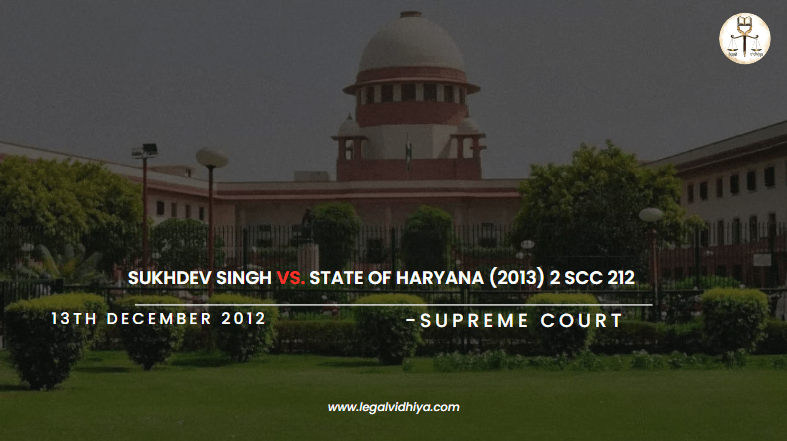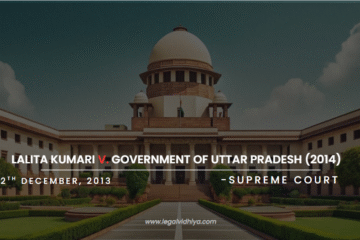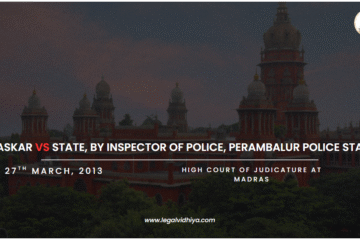
| CITATION | (2013) 2 SCC 212 |
| DATE OF HEARING | 13th December 2012 |
| COURT | The Supreme Court of India |
| APPELLANT | Sukhdev Singh |
| RESPONDENT | The State of Haryana |
| BENCH | Justice Swatanter Kumar and Justice Madan B. Lokur |
INTRODUCTION:
In the landmark case of Sukhdev Singh v. Govt. In State of Haryana (2013) 2 SCC 212, the Supreme Court examined the complex provisions of the Narcotics and Psychotropic Substances Act, 1985 (NDPS Act), observed how the search and seizure which led to conviction of Sukhdev Singh wet. The High Court’s inquiry was based on the procedure followed by Section 50 of the NDPS Act which mandates that an inquiry be referred to a gazetted officer or magistrate, It therefore sets a precedent for the importance of procedural safeguards in the fight against drugs. This case stands as evidence that the judiciary strikes a balance between tough anti-drug laws and protecting civil liberties.
FACTS OF THE CASE:
- The police received secret information that Sukhdev Singh was allegedly selling poppy husk from his house on February 4, 1994, in the village of Jogewala.
- The raid was conducted by ASI Nand Lal and his team, during which they discovered five bags of poppy husk concealed under a heap of chaff in the courtyard of Sukhdev Singh’s residence.
- The notice under Section 50 of the Narcotics Drugs and Psychotropic Substances Act, 1985 (NDPS Act) to Sukhdev Singh which offered him the choice to be searched before a Gazetted Officer or a Magistrate.
- During the trial, a witness from the raiding party, named Nacchatter Singh, was declared hostile, which impacted the prosecution’s case.
- The appeal was directed against the judgment dated March 27, 2008, by the High Court of Punjab and Haryana at Chandigarh in Criminal Appeal No. 802-SB of 1998.
- On December 13, 2012, the Supreme Court delivered its judgment, acquitting Sukhdev Singh as the prosecution failed to establish his guilt beyond a reasonable doubt.
ISSUES RAISED:
- Was the search and seizure done at Sukhdev Singhs place done legally?
- Did the search follow all the provisions of Section 50 of the NDPS Act?
- How trustworthy were the witnesses, the one who changed their stance?
- What weight does a co accused’s statement pointing fingers at Sukhdev Singh hold as evidence?
- Does the substance found qualify as a “commercial quantity” according to the NDPS Act?
- How does the accused’s past criminal history affect their chances of getting bail?
CONTENTIONS OF APPELLANT:
- The appellants pointed out that the various trials took unusually long, and this was a violation of their right to a speedy trial as was provided under Article 21 of the Indian constitution. They argued that this delay was inordinate and unwarranted, thereby violating the right to life and personal liberty.
- It was alleged that the delay in delivery of the judgement hampered the appellants’ defence most seriously. These frustrations caused them to struggle with issues relating to evidence and witness acquisition, and the preservation of their defense in the long-term.
- According to the appellants, the efficient and timely trials are equally the role of the judiciary. They pointed out that the question of delays must await proactive measures by the courts in order not to compromise justice through postponements.
- The appellants pegged their argument on the dictum that ‘justice delayed is justice denied’. They contended that numerous adjournments in their case negated the independence of the judicial system and fairness of the trial and therefore a violation of their right to fair trial at the expense of a miscarriage of justice.
- The appellants sought to demonstrate that procedural irregularities occurred at different stages of the judicial process to delay the process. They claimed that these shortcomings point to the lack of formality in the dispensing of justice and the denial of such fundamental human rights as access to justice on time.
CONTENTIONS OF RESPONDENTS:
- The respondents stated that there were valid reasons for the delays in the trial because the case and the procedures that were required for the trial were complicated. They argued that all the legal processes were strictly observed, and any time loss was in compliance with the law.
- The respondents argued that the above delay did not in any way affect the defense of the appellant. They pointed out that this period was sufficient for the appellant to present his case, amass evidence, and call for witnesses.
- According to the challenged survey, the respondents mentioned that many times, the cause of delay in the judicial system is resulting from many factors that are systemic and procedural causes which cannot be controlled by the parties to the suit. They included problems like numerous and dense caseloads, scarcity of judicial powers, and measures that are aimed at guaranteeing the adequate protection of the parties’ rights in the course of a trial.
- Some of the issues raised were the misconduct of the prosecution, the violation of the rights of the accused and that the prosecution and judiciary complied with the law and legal standard as provided by the statutes during the trial. The respondents were adamant that the trial process was conducted without compromise to the law as any delays recorded were unforeseen and not in any way influenced by anyone deliberately.
- The respondents pointed out that the administration of justice is not only a protection of the rights of the accused persons, but also the protection of society as a whole. They argued for the party that even if it means delaying justice, the court must work extra hard and make sure that the judicial process is not compromised by any shortcuts.
- Some of the respondents noted legal rules from common law, and constitutional provisions providing for reasons for which delay in delivery of justice does not translate to a violation of the right to speedy trial. They suggested that the Supreme Court had to acknowledge the circumstances as well as the cause of the delays before proceeding to say that there was a violation of constitutional rights.
JUDGEMENT:
On the vital question of delay in judicial proceedings and the right to a speedy trial under the Constitution of India let alone Article 21, the Supreme Court of India has perhaps dealt with in its judgments nothing but the central case of Sukhdev Singh vs. State of Haryana 2013 2 SCC 212. The appellant Sukhdev Singh argued that the delaying of his trail infringed on his basic rights and freedoms.
The Supreme Court of India didn’t give it any specific recognition, but the right to speedy trial was available under Article 21 of the constitution because article 21 holds the right to life and personal liberty. It is clear from the Court’s dicta that dilatory justice in criminal trials is prejudicial to proper defence and amounts to a denial of justice. This judgement has shown the need to dispense trials efficiently in order to meet the constitutional requirements.
The Court painstakingly reviewed the protraction in the cases of/of Sukhdev Singh, including the trail and appellate processes. Though the trial was protracted to cover several years, the adversities that delayed the trial were attributed to procedural errors and judiciary’s structural flaws. The Supreme Court noted that there are sometimes unavoidable time gaps but termed any delayed that is unjustified and unwarranted as a blatant violation of the accused’s rights.
On this aspect, the judgement underscored the expectations of the judiciary in regards to time keeping in delivery of trials. The Supreme Court highlighted the importance of case management by the judges to ensure that delays that might cause the postponement of a case are well handled to ensure that justice prevails, though not delayed. The Court claimed that it should stick to the procedural schedule more rigorously and be more answerable to judges to avoid similar delays in the future.
The Supreme Court admitted the fact that the undue and unreasonable delay in case of trial of the present appellant caused prejudice to the judicial system. It also resulted in injustice to the defendant and adverse impact on the conduct of the trial as a whole. The Court called attention to the cliché: justice delayed is justice denied; not to mention that it is a goal of the legal system to ensure that quality works commensurate with reasonable time.
Finally, a decision was made by the Supreme Court to quash the decision of the High Court and requested lower courts to reschedule and enhance the processing of outstanding cases especially those that had taken long durations. It acts as a precedent, which restates the right to a speedy trial and the overall judgment is a deciding factor for all future cases.
ANALYSIS:
Sukhdev Singh VS State of Haryana [2013] 2 SCR 212 deals with the finer aspects of the Narcotic Drugs and Psychotropic Substances Act, 1985. The appellant, Sukhdev Singh, was charged with the transportation of a large amount of narcotic namely, poppy husk. Issues such as whether the procedures were followed during the search and seizure exercise conducted by the police formed the basis of the case. The Supreme conducted a review on how the Section 50 of the Act was followed, which provides that a person is entitled to be informed of the right to be searched by a Gazetted Officer or a Magistrate. This case is important because it highlights a crucial issue of defending the accused in overly strict drug control legislation. As mentioned in the judgment, the law enforcement agencies have to adhere to the legal provisions in a bid to make sure that not only was justice prevailed, but it was also apparent.
CONCLUSION:
The case of Sukhdev Singh vs State of Haryana, (2013) 2 SCC 212 is the most relevant landmark case that raises attention for the judiciary on how it can ensure extensive enforcement of anti-drug laws that are dominant today while at the same time protecting civil liberties. The Supreme Court’s judgement also underscored the relevance of compliance with the procedural requirements to the case under the NDPS Act, and specifically Section 50 that provides for search before the gazetted officer or magistrate. This case was foundational in moulding this premise as the Supreme Court observed how procedural defaults and unreasonably long judicial proceedings could gravely jeopardise the defence, and hence, be contrary to the provisions of Article 21. The failure by the prosecution to make a prima facie case against Sukhdev Singh on the charge preferred against him shows that the judiciary in the Court rightly sought to dispense justice that is at once fair and speedy. This judgement emphasizes some of the important maxims of justice which are justice delayed is justice denied and advocates the need to have more judges on seat to reduce the time taken in similar cases.
REFERENCE
This Article is written by Syed Sumair Ahmed Shah student of Institute of Law (University of Sindh); Intern at Legal Vidhiya.
Disclaimer: The materials provided herein are intended solely for informational purposes. Accessing or using the site or the materials does not establish an attorney-client relationship. The information presented on this site is not to be construed as legal or professional advice, and it should not be relied upon for such purposes or used as a substitute for advice from a licensed attorney in your state. Additionally, the viewpoint presented by the author is of a personal nature.



0 Comments